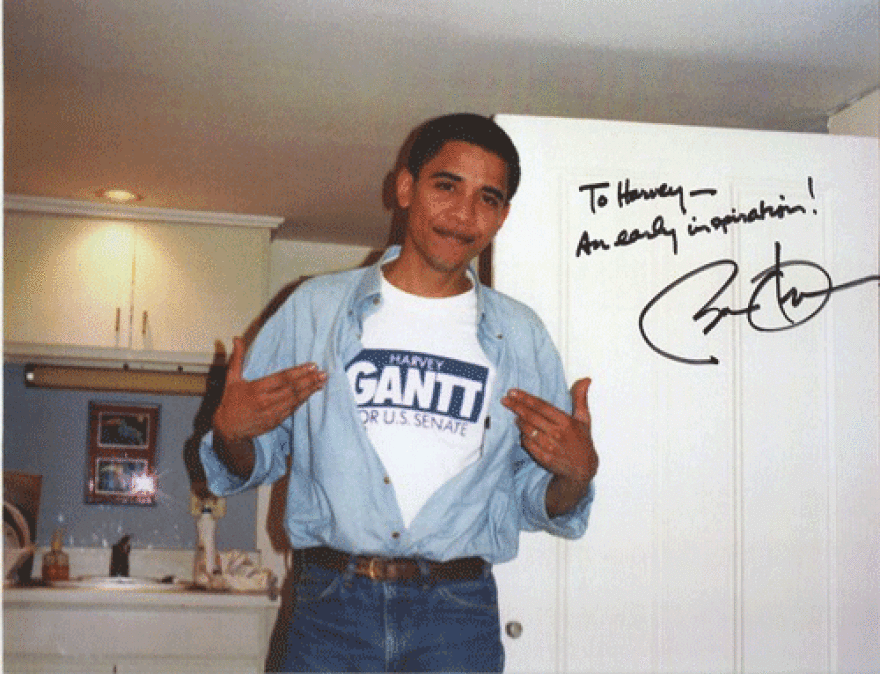This week at the Democratic Convention in Charlotte, elected officials from this state will be in the spotlight. Charlotte Mayor Anthony Foxx and Governor Bev Perdue spoke last night, and former Governor Jim Hunt will get his chance later today.
It’s also a big moment for others who paved the way. Harvey Gantt was the first black mayor of Charlotte. He also ran twice against Jesse Helms for the U.S. Senate. And without the trails he blazed in the second half of the 20th century, this convention, and his adopted state, would be very different.
[Audio transcript]
Dave DeWitt: When he was in high school in Charleston, South Carolina in 1960, Harvey Gantt was fascinated by the sit-in movement then sweeping through the south. So he and his teenage friends organized one, without telling their parents.
It went the way sit-ins went in those segregated days – they sat down where only whites were allowed to sit, they were told to leave, and they didn’t. Then, of course, they were arrested.
But these were high school kids, so their parents had to come get them out of jail. And when they did, they made an effort to show how angry they were with their teenage kids – at least in front of the police.
Harvey Gantt: It was not until we were headed home that my parents said “you know what, I’m just really proud of you. You all had the guts to do that, and that’s great.”
Guts was not something Harvey Gantt has ever lacked. After high school, he applied to Clemson University several times. Despite stellar grades, he was denied admission. So he sued. The case went all the way to the U.S. Supreme Court, but he won, and he became the first Black student at Clemson.
In an appearance on The State of Things, Gantt recalled the strategy offered by one of the segregationists.
Gantt: Just before I entered Clemson, he said now Harvey Gantt’s won the lawsuit, now if you students would just isolate him socially, ostracize him, he will be so uncomfortable working on a difficult course like architecture, then he will leave and we’ll be back to our beloved all-white institution.
That didn’t happen. Gantt made good friends and graduated near the top of his class. He came to Charlotte, opened an architecture firm, and got involved in city politics. Eventually, he became the city’s first Black mayor in 1983.
But his sights were set higher than that, and he decided to take on Jesse Helms for the U-S Senate. If he won, he would have been the first African-American senator from the south since reconstruction.
But many in the democratic establishment didn’t want him to run. Mel Watt is a Congressman from Charlotte now, but back then he was running Gantt’s campaign.
Mel Watt: Harvey was so charismatic and articulate in the delivery in his message that he quite often - especially in crowds where democrats weren’t necessarily on the tem yet either - it was just amazing to see how he dealt with the crowds.
Gantt’s campaign became a national cause. Money poured in, and he took a late lead in the polls. But then, in the last week of the race, Helms aired one of the most infamous TV ads in political history.
TV AD: You needed that job. You were the best qualified, but they had to give it to a minority because of a racial quota. Is that really fair? Harvey Gantt says it is…
On election day, Helms captured all the undecided votes the polls said were out there, and defeated Gantt by five points.
Helms’s legacy would be defined by that racist ad… Gantt’s legacy is still ongoing. Helping along on those campaigns was a young kid from Charlotte named Anthony Foxx… now the second-black mayor in Charlotte’s history.
Anthony Foxx: Well Harvey Gantt is a pioneer. There’s no question he’s one of the most dynamic leaders in Charlotte’s history and certainly in North Carolina’s history and paved the way for so many young elected officials who are in office now, including our president.
In a hallway in Gantt’s house hangs a photo. It’s a 29-year-old Barack Obama, still in Harvard Law School. He’s opening up his button down shirt to reveal a Harvey Gantt For U.S. Senate t-shirt. The picture is signed by the President, and reads “To Harvey: An Early Inspiration.”
Gantt’s legacy may reach all the way to the White House and to Congress, but he believes the two races he lost for Senate to Jesse Helms also has some lingering effects here in North Carolina.
Gantt: I always believe that even though I lost both of them that North Carolina was heading in the direction of the kind of vision I had for the state. Clearly the views I held with regard to education and health care were more of where the state was going than Jesse’s views of the world.
Harvey Gantt is almost 70 years old now. And although he isn’t getting a primetime speaking slot at the Democratic convention, he’s still a major presence in Charlotte and in North Carolina. It shows up in the current generation of political leaders and in the policies they champion. It’s something he says he’s proud of.
Not unlike the pride his parents felt all those years ago as they pulled away from a Charleston jail.


